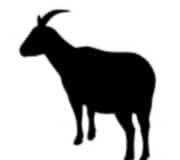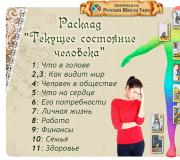Rare Ukrainian names. Male and female Ukrainian names, modern and rare
The history of the Abkhazians, one of the oldest Abkhaz-Adyghe peoples, has its roots in the distant past. Even ancient historians talked about the legendary Colchis, inhabited by numerous Abkhaz and Georgian tribes. Already from the 1st century AD, Christianity began to spread in the territory of modern Abkhazia, and in the second half of the 6th century it became the dominant religion here. Nevertheless, the Abkhazians sacredly respected their ancient traditions, including maintaining adherence to their national names.
Reasons for the diversity of Abkhaz names.
The number of national Abkhaz names is endless. Their appearance was influenced by historical processes, the structure of Abkhaz society, the diversity ethnic composition population, rich folk art, neighboring cultures. It is striking that in the presence of an official faith and in the absence of a written language that would consolidate the knowledge and experience of previous generations, the Abkhazians managed to preserve their male and female Abkhaz names.
This does not mean that the Abkhazians did not use official Christian, as well as Muslim names, who penetrated to them from neighboring Turkey. They were used mainly by representatives of the nobility. They called the children Greek and Roman names - Alexander, Julian. In the 17th-18th centuries, Muslim names appeared among Abkhazians - Aslanbey, Keleshbey, Safarbey. Then Georgian and Russian names become widespread. Changes in the Abkhazian nomenclature testify to the socio-economic, political and cultural life of this people.
National names of Abkhazians.
And yet, the dominant place belongs to the indigenous Abkhaz names. Ancient names always had their own special meaning and carried a certain semantic load. So, Abkhazian names for boys and girls were more like nicknames that highlighted some characteristics of a person - Ahra (rocky peak, cliff), Gyzmal (cunning), Kyach (short), Khapsh (red-headed), Sabi (baby).
Nowadays no one will name a child Bear or Mouse, but in the distant past “totemic” names were quite popular. Most boys were given these names: Abga (wolf), Khvinap (rat, mouse), Tsgvy (cat). The girls were given “bird” names or names of celestial bodies, plants - Dzykut (water hen), Kacich (grape variety), Mramza (sun-moon), Cuarasa (dove). Many female names bore a golden “shade” - Feldysh (golden cloth), Khibla (golden-eyed), Khfaf (gold-eating), Khtsis (golden bird).
A person’s name could indicate his nationality - Urys (Russian), Chachan (Chechen), Shvamakh (Armenian), Sharamet (Sarmatian). A huge number of names are taken from folk legends and fairy tales; they are also popular among modern Abkhazians. Boys are called by names legendary heroes– Alkhuz, Ampar, Yeryz, Batakva, Atlagikva. Girls are often given the names of fairy-tale princesses and beauties - Nutsa, Kuara, Ragva, Gunda, Guashahan.
The source of Abkhazian names is inexhaustible. It is not surprising that representatives of this ancient people treat the heritage of their ancestors so carefully and continue to name their children with beautiful old names.
The key influence on the formation of names in Abkhazia was the people’s belief in the existence of spirits, souls and into the animation of nature. Most of them came from words meaning the names of plants, animals or natural phenomena.
Literature had no less influence on the process of name formation, since many generations of Abkhazians named their children in honor of mythical characters and heroes of legends.
The ethnic characteristics of the population of a certain area also turned out to be important. This led to the fact that, along with the original national Abkhaz names, those borrowed from other peoples (for example, from the Persians, Turks or Arabs) began to appear.
Thus, Today in Abkhazia there is big variety names and this is due to factors such as:
- ethnic composition of the population;
- rich folk art;
- structure of social life;
- historical past of the mountainous country.
All Abkhaz names for girls that have undergone changes are associated with changes in cultural values, the economic life of society and the emergence of political conflicts.
Despite all the factors influencing the formation of female names, the dominant place is still given to indigenous names.
Due to frequent migrations of mountain peoples, Abkhazia has become a multinational country, therefore often the choice of naming for a baby depended on the nationality of the parents. Children who appeared in the family could be given names of Armenian, Russian or Chechen origin.
In addition, in ancient times there was a tradition among the Abkhazians according to which a certain ending or suffix was added to the names of all members of the same clan. For example, the names of all relatives could end with the letter “c” and this meant the blood relationship of the bearers of these names.
How to choose for girls?
Previous generations of Abkhazians know many legends and traditions, on the basis of which many names were borrowed that personified heroes from folk epics. Modern residents of Abkhazia do not change these traditions - girls are named after fairy-tale beauties who are certainly saved by heroes or goddesses.
Also, the naming of girls was often associated with:
- names of beautiful birds, geographical objects, celestial bodies;
- mythical creatures;
- character traits;
- with concepts such as gold or fire.
If parents cannot decide on a name for a baby for a long time before it is born, then immediately looking at the newborn, they determine its temperament or compare it with something, after which they name it accordingly.
List of modern variants
Although current residents of the North Caucasus try to name their children according to fashion trends, they still do not forget their traditions and try to respect them when choosing a name. Most modern names sound elegant, noble, and in the future the child associates his personality with their meaning.
Recently, the following names have been registered very often:

No matter how much parents like something modern name, it is important to always take into account its consonance with the child’s patronymic and surname, so that everything can be easily pronounced and not get confused.
Rare most beautiful options
Rare female names make their owners feel special. In addition, it increases self-esteem and encourages creative development. And more and more often, parents prefer to call their daughters beautiful and at the same time unique names. The following options are considered such in Abkhazia.
Modern Abkhazian names are the result of the centuries-old evolution of this people. They fully reflect all the cultural, historical, religious and ethnic characteristics of the Abkhazians. Getting to know the meaning of Abkhaz names for girls and boys makes it possible to study the linguistic and behavioral traditions of a. At the same time, it allows us to analyze the nature of the interethnic ties of this people and draw certain conclusions about the peculiarities of the relationship between the Abkhazians and the population of neighboring states.
Origin of modern male and female Abkhaz names
The key influence on the formation of the original female and male Abkhaz names was exerted by the ancient totemistic and animistic beliefs of the people. Many names come from words denoting animals, plants and various natural phenomena. Literature had an equally significant impact on the process of national creativity. often named after heroes of ancient legends and mythical characters.
Along with the original national popular Abkhaz names for boys and girls, there are also those that were borrowed from other peoples. Many of them are of Arab, Persian and Turkic origin.
List of popular Abkhaz names for boys
- Abgar. Translated from Abkhazian - “robber”
- Aitar. Fertility deity from Abkhazian mythology
- Bagrat. From Persian "given by God"
- Guatei. Abkhazian boy name meaning "restless"
- Damir. From Arabic "persistent"
- Jabel. Translated from Abkhazian as “hare”
- Kurch. Arabic name for a boy, meaning "wolf"
- Temyr. Abkhazian version of the name Timur = “iron”
- Sharakh. Translated into Russian, the Abkhaz name of a man has the meaning = “game” / “deer”
List of the most beautiful Abkhaz names for girls
- Amra. The character of Abkhazian mythology is one of the seven parts of the deity Aitara
- Arikhanda. Abkhazian version of the name Ariadne = “saint”
- Gunala. Translated into Russian, the Abkhaz name of the girl has the meaning = “flexible”
- Gunda. From Abkhazian “beautiful, powerful white horse”
- Jaja. Goddess of gardening and field cultivation in Abkhaz mythology
- Zimana. Translated into Russian, the Abkhaz name of a woman means “good”
- Mramza. Abkhazian girl name meaning "sun and moon"
- Saunau. Patroness of hand-grinding grain from Abkhaz mythology
- Khibla. Translated into Russian = “girl with golden eyes”
Features of the meaning of common Abkhaz names
Many male and female Abkhaz names have a meaning related to the tribal and national affiliation of their bearers. In ancient times, a Russian person living on the territory of Abkhazia was called Urys, an Armenian was called Shvamakhy, a Chechen was called Chachan, etc. In addition, there was a tradition according to which a certain format (suffix or ending) was added to the names of all members of the same clan. An example would be such lucky male Abkhaz names as Kuadats, Mats, Zhyats. They all end with the letter "t". This means that their carriers are members of the same genus.
Oleg and Valentina Svetovid are mystics, specialists in esotericism and occultism, authors of 15 books.
Here you can get advice on your problem, find useful information and buy our books.
On our website you will receive high-quality information and professional help!
Abkhazian names
Abkhazian male names and their meaning
Except originally Abkhazian names On the territory of Abkhazia, many Persian names are used, there are Arabic, Turkic and other names.
Abkhazian male names
Abga- wolf
Abrag– arbek
Abrskil– hero
Adamur, Adamyr
Aidamir
Adgur– a strong defender, ready to sacrifice himself, brave, invincible, shepherd
Adlagiqua
Adley
Akulan
Alkhas- special
Anos- Friend
Henri– courageous
Arut, Arutan- Sun
Arysh
Aslan- a lion
Astamur (Astik)– real iron, invincible
Astemir
Akhra- rock, cliff
Akhutsa
Bagrat- joy of love, gift of God
Barnuk
Baslahu
Batal- hero, warrior, hero
Bashnukh, Bashnykh– kind-hearted
Bejan (Bizhan)
Beslan– strong, solid, inaccessible, lion king
Beslam
Bzhayua-Bzhadza– wet (semi-dry-semi-raw)
Bzou- good, kind
Ghazia
Georgiy– farmer
Guatei– restless
Gozar
Gudisa- rough heart, cruel
David- Darling
Damey
Damir– iron, persistent
Daur- Darling
Jamal- Beautiful
Jamlat
Jansukh- strong soul
Jarnaz
Jesib, Jazib- endearing
Jabal– male hare
Edgi- Adyghe
Edigya- Adyghe
Ezygu- from the name of the Sarmatian tribe Iazyges
Zaur, Zuhur– famous, renowned, victorious warrior
Sym
Zekan
Iatkyar- as a keepsake
Inal- son of the king
Kaimet- Judgment Day
Kamug
Karach– Karachay
Konstantin, Konstantine- constant
Kuj- wolf
Lasha- light
Levan
Levarsa
Manuchar
Mard- from the ancient Iranian tribe of Mards
Mjihad
Mizan– divine justice, scales of deeds
Mkan– having health
Murat– desired
Myshv- bear
Mshwagu- fearless heart
Naga– worthy
Naur
Nayuey– Nogai
Nowruz- spring Festival
Nuri- light
Ochamchira
Ratmir- warrior, defender of peace
Rostom (Rustam)- hero
Ruslan- a lion
Said- sir
Sandro– protector of people
Seto
Sethrak
Tariel
Tatasch– peacock
Teimuraz
Teymur, Temir– iron
Timur- iron, strong, durable
Tkuarchal
Uazamat- from the name of the Sarmatian or Meotian tribe of Yazamats
Urys- Russian
Hajarat– powerful warrior
Hasik
Hatazhuka
Huap
Khyrzaman, Akhyrzaman- end of the world
Chachan– Chechen
Chincha– nettle
Sharakh
Sharmat- from the ancient Ossetian tribe of Sarmatians
Shvamakh– Armenian
Shvanyua, Shkhanykua– mountain walker
Schwarach- game
Shiruan
Shabaz- Shah's falcon
Shaaban
Shabat– check
Shahan
Shman
Shryn- sweet
Shchaadat
Enver- Beautiful
From this page look:
Our new book "The Energy of Surnames"
Book "The Energy of the Name"
Oleg and Valentina Svetovid
Our address Email: [email protected]
At the time of writing and publishing each of our articles, there was nothing like this in free access not on the Internet. Any of our information products is our intellectual property and is protected by the Law of the Russian Federation.
Any copying of our materials and publication of them on the Internet or in other media without indicating our name is a violation of copyright and is punishable by the Law of the Russian Federation.
When reprinting any materials from the site, a link to the authors and site - Oleg and Valentina Svetovid – required.
Abkhazian names. Abkhazian male names and their meaning
On our websites we do not provide links to magic forums or websites of magic healers. We do not participate in any forums. We do not give consultations over the phone, we do not have time for this.
Note! We do not engage in healing or magic, we do not make or sell talismans and amulets. We do not engage in magical and healing practices at all, we have not offered and do not offer such services.
The only direction of our work is correspondence consultations in writing, training through an esoteric club and writing books.
Sometimes people write to us that they saw information on some websites that we allegedly deceived someone - they took money for healing sessions or making amulets. We officially declare that this is slander and not true. In our entire life, we have never deceived anyone. On the pages of our website, in the club materials, we always write that you need to be an honest, decent person. For us, an honest name is not an empty phrase.
People who write slander about us are guided by the basest motives - envy, greed, they have black souls. The times have come when slander pays well. Now many people are ready to sell their homeland for three kopecks, and it is even easier to slander decent people. People who write slander do not understand that they are seriously worsening their karma, worsening their fate and the fate of their loved ones. It is pointless to talk with such people about conscience and faith in God. They do not believe in God, because a believer will never make a deal with his conscience, will never engage in deception, slander, or fraud.
There are a lot of scammers, pseudo-magicians, charlatans, envious people, people without conscience and honor who are hungry for money. The police and other regulatory authorities have not yet been able to cope with the growing influx of "Deception for profit" madness.
Therefore, please be careful!
Sincerely – Oleg and Valentina Svetovid
Our official sites are:
Love spell and its consequences – www.privorotway.ru
And also our blogs:
Many peoples live on the modern territory of Ukraine: Ukrainians, Russians, Belarusians, Greeks, Armenians, Jews, Bulgarians, Georgians. This diversity of nations is due to historical development of this state. Ukrainian female names have an ancient and original history.
Brief information about the history of the appearance of Ukrainian names
In ancient times, the lands of Kyiv, Zhitomir, Poltava, Chernigov and other central regions of Ukraine were inhabited by tribes of pagan Slavs. The emergence of the state of Kievan Rus is associated with the legend about the arrival of the Vikings, who were the first rulers of Rus': Rurik, Igor, Olga, Oleg - all these names are of Scandinavian origin.
After the Christianization of Rus' by Prince Vladimir, the original Slavic and Scandinavian pagan names began to be gradually replaced by Greek ones. However, fortunately, the people did not abandon their culture. Newborns began to be given two names: one - Slavic (pagan), and the other - Greek (Christian). It was the stability of tradition that made it possible to preserve the original flavor of Slavic names.

With the further division of Rus' into the Kiev and Moscow principalities, with the expansion of the territory of the state and the settlement of the Slavs from Moscow to the shores Sea of Azov, Russian and Ukrainian female names, which historically have a common origin, began to differ.
The difference between Russian and Ukrainian names
When the center Kievan Rus shifted to the Principality of Moscow, Christianity became a truly native religion for the people of Rus', classes appeared in society (peasants, boyars, princes), and cultural interaction between the state and other countries of Europe and Asia began to develop. As a result of the strengthening of Christianity as state religion newborns were given two names: one was chosen according to the calendar (this name was often recommended by the priest), and the second was Slavic, used in the home circle.
With the increase in literacy in society, Slavic names began to gradually fall out of use and were replaced by Christian names, especially those mentioned in sacred texts. Old Russian and then Russian society, especially its most affluent stratum, increasingly adopted European culture.

At the same time, on the territory of modern Ukraine, ancient traditions were preserved and maintained among the common people. If in Ancient Rus' Slavic names were used mainly in the family, and officially a person was represented by the name given to him at baptism, then in Ukraine the situation was the other way around. The main name was considered Slavic. Perhaps this is the reason why Ukrainian female names have retained their national flavor.
Phonetic features of Ukrainian names
Foreign names, once in the ancient Russian environment, changed their pronunciation. For example, Greek name Anna in the Ukrainian language took the form Ganna, the name Ksenia - Oksana, and the name Theodora - Todora.
This happened because in Old Russian language, which was spoken 1000 years ago by the Slavs of Kievan and Muscovite Rus' (it was one language), sound f- was not there at all, for the Slavs it was difficult to pronounce, and it was replaced with a more convenient sound T-. This is how the name Todora appeared.

And the sound A- in the language of the Eastern Slavs never stood at the beginning of a word (absolutely all concepts that in Russian or Ukrainian begin with A-, are of foreign origin: watermelon, arba, aria, aquamarine). This is how the Ukrainian forms appeared: Oleksandr, Oleksiy, Olesya, Oksana. From parallel Russians, for example Aksinya, formed from the Greek Xenia.
It must be said that replacing the initial A- on O- was characteristic of the entire folk environment of Rus' (and not just the territory of modern Ukraine). Thus, the Russian merchant from Tver Afanasy Nikitin in his book “Journey over Three Seas” (XV century) calls himself Ofonasiy.
Ancient monosyllabic female names
Ancient Ukrainian female names can consist of one root (Vera, Volya, Zhdana). Some of these ancient names are common, while others have fallen out of use. Monosyllabic female names for Ukrainians include, for example, those presented below.
Ancient two-syllable female names
Currently, Ukrainian female names consisting of two roots are a little more common. Vladislava - from the words “glory” and “vlada” - strength, courage. Zlatomir - from the concepts of “peace” and “gold” - gold. The meaning of native Ukrainian female names (list below) is sometimes easy to determine independently by the root of the word. Next, let's look at specific examples. Two-syllable Ukrainian female names are beautiful, melodic, colorful. They reflect the music and poetry of the people. An example of them are the following: Bozhemila, Boleslava, Bratolyuba, Dobrogora, Druzhelyuba, Zlatomira, Lyubava (“beloved”), Lyubomila, Lyubomira, Lyuboslava, Mechislava, Miroslava, Mudrolyuba, Radmira, Svetlana, Svetoyara.

As can be seen from this list, rare Ukrainian female names most often contain the syllables - glory, -love, -mila, -peace. It can be assumed that this principle of word formation contains the primordial values of the Slavs: to be loved, feminine (“sweetheart”), kind (“peace”) and brave (“glory”).
Modern Ukrainian names
In modern Ukraine, we mainly find the same names that are used in Russia and Belarus. They are of Slavic, Greek, Roman, Jewish and Scandinavian origin. However, unlike Russian society, in Ukraine there is a gradual increase in interest in ancient names, which indicates an increasing spirit of patriotism in society and attention to its own cultural traditions. This is especially true for western regions countries where newborn girls are increasingly given the ancient Slavic names presented above.
However, despite the fact that the number of newborn girls who are given Slavic names increases every year, in the country as a whole the choice of names is still influenced by the general fashion from Eastern Europe.

Popular female Ukrainian names: Alina, Alisa, Anna / Hanna, Bogdana, Victoria, Veronica, Darina, Diana, Elizaveta, Katerina / Ekaterina, Christina, Lyudmila, Nadezhda, Natalya, Maria, Oksana, Olesya, Sofia, Tatyana, Ulyana, Yulia .
Conclusion
Female names common on the territory of modern Ukraine are diverse both in meaning and in history of origin. However, of all the East Slavic peoples, Ukrainians (especially from the western regions of the country), it seems, have retained ancient Slavic names in their onomasticon more than others. Once upon a time they were used by all Slavs, but with the adoption of Christianity they were gradually replaced by Greek and European ones.




